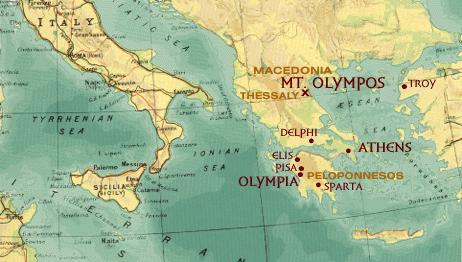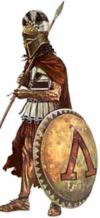|
Sparta was a Dorian Greek military state, originally centered in Laconia. As a city-state devoted to military training, Sparta
possessed the most formidable army in the Greek world, and after achieving notable victories over the Athenian and Persian
Empires, regarded itself as the natural protector of Greece. Laconia or Lacedaemon was the name of the wider city-state centered
at the city of Sparta, though the name "Sparta" is now used for both. The Kings of Sparta were believed to be the
direct descendants of Heracles.

Sparta, by the 4th century BC, was the most powerful nation in all of Greece. Unlike many of the Greek city-states it had
only one colony, and most of its power came from alliances with other regions. Sparta was not an empire: no tribute was paid
except in times of war. What Sparta essentially formed was a league, and they chose their allies strategically. For example,
Sparta favoured Corinth because of its naval fleet. The allies would vow to have the same friends and enemies, follow Sparta
wherever they led, and not go to war unless all the allies were in consensus. The league's governmental structure was an oligarchy
run by aristocrats; it met in Corinth and was led by Sparta. The Congress, as it was called, consisted of representatives
from each of the allied city states who each held one vote..
|

Around 750 BC, Sparta began expanding slowly but steadily. The subjugated population of Laconia either became Helots or Perioeci.
The Helots kept their farmland but were required to deliver half of their output to the Spartan state, while the Perioeci
were inhabitants of cities that remained autonomous, save in matters of foreign affairs and military actions. The Perioeci
formed a vital part of Spartan society. As Spartans were forbidden non-military pursuits and occupations, the Perioeci worked
as traders, craftsmen, and artists. From 650 to 620 BC, Sparta brought Messenia under its control. In the first third of the
6th century Sparta was defeated by the city of Argos, and later by Tegea. It was against the backdrop of the Messenian war
and the following defeats that the unique Spartan way of life developed, which made Sparta famous in Ancient Greece.
 |